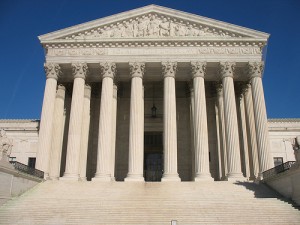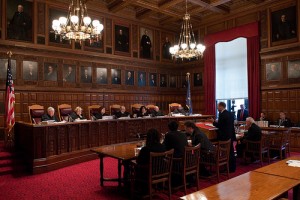Per the adoption of the Americans with Disabilities Act (ADA), accommodating persons with disabilities is the norm. Twenty-five years after the Act’s passage, the Supreme Court will decide whether it applies to police officers arresting a mentally ill suspect one who is armed and violent.
In City & County of San Francisco v. Sheehan the Supreme Court will decide whether, pursuant to the Americans with Disabilities Act (ADA), police must accommodate a suspect’s mental illness when arresting him or her. The State and Local Legal Center’s (SLLC) amicus brief argues no because no conclusive evidence indicates that accommodating mentally ill suspects reduces injuries or the use of force. IMLA filed a separate amicus brief in this case making different arguments than those made in the SLLC’s brief.
When police officers entered Teresa Sheehan’s room in a group home for persons with mental illness she threatened to kill them with a knife she held, so they retreated. When the officers reentered her room soon after leaving it, Sheehan stepped toward them with her knife raised and continued to hold it after the officers pepper sprayed and ultimately shot her. Sheehan survived.
Title II of the ADA provides that individuals with a disability must be able to participate in the “services, programs, or activities of a public entity,” and that their disability must be reasonably accommodated.
Sheehan argues that Title II of the ADA applies to arrests and that the officers should have taken her mental illness into account when reentering her room. Her proposed accommodations included: respecting her comfort zone, engaging in non-threatening communications, and using the passage of time to defuse the situation.
The Ninth Circuit agreed with Sheehan that Title II of the ADA applies to arrests. The ADA applies broadly to police “services, programs, or activities,” which the Ninth Circuit interpreted to mean “anything a public entity does,” including arresting people. The court refused to dismiss Sheehan’s ADA claim against the city reasoning that whether her proposed accommodations are reasonable is a question of fact for a jury.
The Ninth Circuit also concluded that reentry into Sheehan’s room violated the Fourth Amendment because it was unreasonable. Although Sheehan needed help, “the officers had no reason to believe that a delay in entering her room would cause her serious harm, especially when weighed against the high likelihood that a deadly confrontation would ensue if they forced a confrontation.”
State and local government officials can be sued for money damages in their individual capacity if they violate a person’s constitutional rights. Qualified immunity protects government officials from such lawsuits where the law they violated isn’t “clearly established.”
The Ninth Circuit refused to grant the officers qualified immunity related to their reentry: “If there was no pressing need to rush in, and every reason to expect that doing so would result in Sheehan’s death or serious injury, then any reasonable officer would have known that this use of force was excessive.” The Court will review the Ninth Circuit’s qualified immunity ruling.
The SLLC’s amicus brief argues that the ADA should not apply to arrests. While few police departments have the resources to adopt specialized approaches to responding to incidents involving the mentally ill, no conclusive evidence indicates that these approaches reduce the rate or severity of injuries to mentally ill suspects. No one-size fits-all approach makes sense because police officers encounter a wide range of suspects with mental illnesses. And even psychiatrists—much less police officers who aren’t mental health professionals—cannot predict with any reasonable degree of certainty whether an armed suspect with a mental illness will harm himself or herself or others in an emergency. Finally, because the officers in this case could not predict whether Sheehan would harm herself or others if they did not reenter her room, they are entitled to qualified immunity.
Orry Korb, Danny Chou, Greta Hanson, and Melissa Kiniyalocts, County of Santa Clara, California wrote the SLLC’s amicus brief which was joined by the National League of Cities, the National Association of Counties, the International City/County Management Association, and the United States Conference of Mayors.





